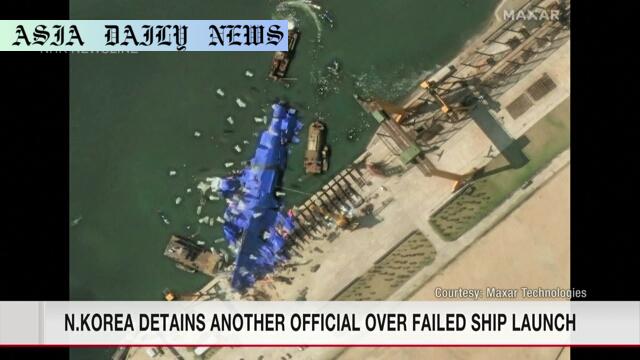Detained – Deputy head responsible for failed destroyer launch detained after investigation reveals significant errors.
- Detained officials include the deputy head of the Munitions Industry Department.
- Investigation reveals serious negligence leading to the destroyer failure.
- Images show a partially submerged destroyer, with restoration underway.
- Kim Jong Un criticized the mishap and called it a ‘criminal act.’

North Korea’s Leadership Holds Officials Accountable
In the aftermath of what leader Kim Jong Un has described as a “criminal act,” North Korea has detained another high-level official following the failed launch of a warship at a northeastern shipyard. This incident, which occurred during the ceremonial unveiling of the destroyer, has drawn significant criticism from the nation’s leadership. The latest arrest involves the deputy head of the Munitions Industry Department under the Workers’ Party’s Central Committee. According to official reports, this figure has been charged with significant negligence leading to the catastrophic failure.
The ship, lying partially submerged and on its side, symbolizes a major setback for the country’s military aspirations. Satellite images reveal the damaged vessel with support ships working frantically to restore its stability. This mishap has already resulted in the detentions of four officials, underscoring the gravity with which the North Korean regime addresses such operational failures.
Kim Jong Un’s Strong Stance on Accountability
Attributing the incident to “irresponsible errors and oversight,” Kim Jong Un has called for strict scrutiny and accountability among senior officials. This marks a continuation of his governance style focusing on discipline and responsibility. Officials are expected to face stronger repercussions during the Central Committee’s forthcoming plenary meeting in June. The acknowledgment of such mishaps as “criminal acts” further cements the regime’s stance against perceived operational inefficiencies. Nonetheless, this move could further instill fear and a more rigid bureaucratic hierarchy among the nation’s political elite.
Implications for the Military and Political Dynamics
The failed launch highlights problematic elements within North Korea’s military-industrial complex. It also generates questions about the regime’s ability to execute large-scale endeavors successfully. Efforts to balance the capsized destroyer imply significant resource allocation, diverting attention from other pressing national priorities. The greater emphasis on accountability might lead to political power shifts within the leadership circle as blame is cast and consequences are dealt. While the crackdown on high-ranking officials may remedy inefficiencies in the short term, it risks fostering an atmosphere of distrust and paranoia.
Global Perspectives and Speculation
International observers are closely watching the development, theorizing about the underlying reasons for the ship’s failure and its impact on North Korea’s geopolitical standing. The event’s outcomes could signal both weaknesses in the country’s technological and procedural proficiencies. Moreover, repeated accidents could erode the image that North Korea projects internally and externally as a nation with unstoppable military ambitions. Meanwhile, countries focused on diplomacy may find these failures as pressure points for negotiations, with potential implications for regional stability in Northeast Asia.
Overall, the detentions further underline the unpredictable and frequently tumultuous governance approach in North Korea. This case serves as an example of how singular events can shape both domestic politics and international perceptions of the secretive state.



Commentary
Accountability Amidst Adversity
The recent detentions of officials in North Korea following the failed destroyer launch demonstrate Kim Jong Un’s no-tolerance approach toward errors in critical national projects. Whether viewed as a genuine effort to hold leadership accountable or as a strategy to maintain political dominance, these actions emphasize the weight placed on success in high-stakes operations. The arrest of four officials, including one from the prestigious Munitions Industry Department, signals that no position comes with immunity when failures occur in this authoritarian regime.
Examining North Korea’s Political Landscape
For external analysts, these detentions provide valuable insight into North Korea’s inner workings. Such moves serve as a warning to those in power that responsibilities are heavy, and even minor missteps can lead to drastic consequences. However, this could potentially weaken the morale within the ranks of leadership or create an environment where officials operate out of fear rather than efficiency. This rigid control system may deter innovation and risk-taking, elements necessary for technological advancement in the nation’s military infrastructure.
The Global Context of North Korea’s Challenges
On the international front, such incidents expose vulnerabilities that come with isolationism. The inability to develop projects seamlessly might be attributed to limited collaboration or insufficient resources, making the country highly reliant on its internal systems. For neighboring countries like South Korea and Japan, such mishaps offer opportunities to assert strategic relationships and deter potential aggression.
Overall, the series of arrests paints a picture of a leadership unyielding in its expectations and ruthless in its approach to governance. These events are a stark reminder of the persisting opacity within the regime, inspiring both concern and analysis among policymakers and global strategists alike.